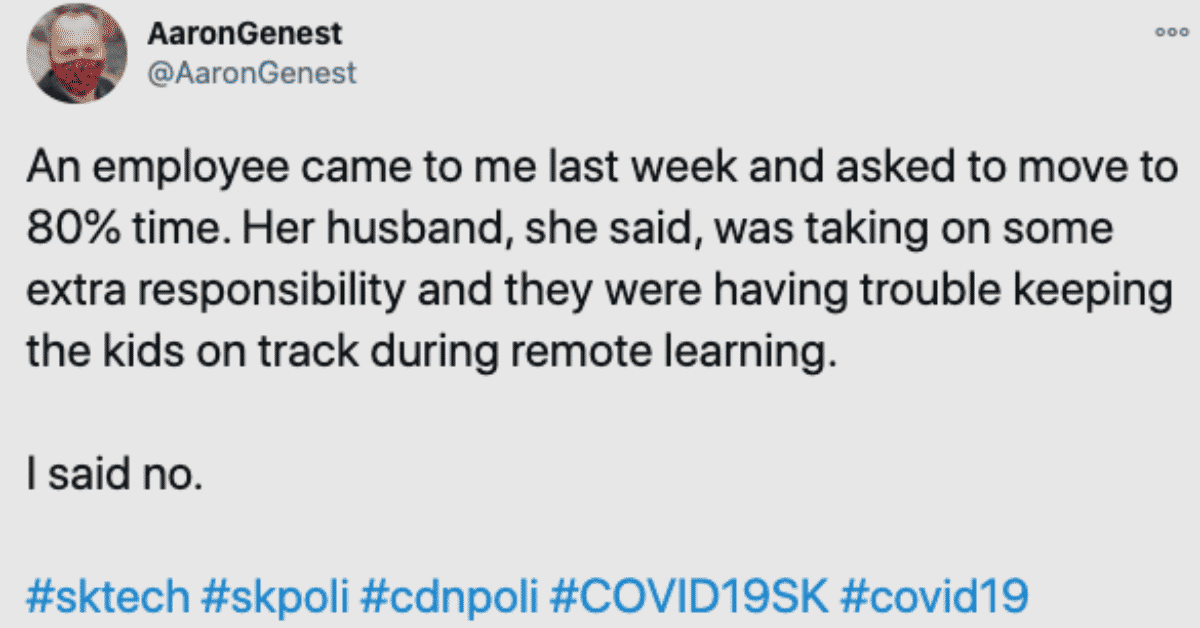Boss Shares Why He Rejected A Working Mom’s Request To Cut Back To 80% Time At Work
The COVID-19 pandemic has forced a lot of people to adapt to a new way of being. Everything has changed: childcare, school and work environments, spending money, transportation, running errands, and socializing.

Adjusting to this new way of life has hurt everyone, but it has hurt working women with families the most. Even with supporting partners, working women are falling behind because of their duties at home and because men are valued more in the workforce.
Aaron Genest, president of SaskTech, told a story about a female employee who asked to cut back on work to 80%—and his tweets have sparked a debate.
Now, people are talking about how we can best help female employees who feel they have no choice but to cut back on hours or leave their jobs.
Genest began the thread by stating they employee came to him asking to cut time spent at work to 80% because her kids were having trouble staying on track with remote learning. He refused her request.
An employee came to me last week and asked to move to 80% time. Her husband, she said, was taking on some extra responsibility and they were having trouble keeping the kids on track during remote learning.
I said no.#sktech #skpoli #cdnpoli #COVID19SK #covid19
— Aaron Genest @smartbottom.bsky.social (@AaronGenest) January 11, 2021
Now, that might sound harsh, but Genest continued discussing his concerns and solutions. He explained that women in the workplace have been “disproportionately affected by COVID, erasing decades of gains.”
Women in the workplace have been disproportionately affected by COVID, erasing decades of gains. And it’s easy to see why when women typically earn less (even for the same jobs) than their partners. https://t.co/2jObc3Ifn0
— AaronGenest (@AaronGenest) January 11, 2021
And that there is an incorrect assumption that “we should expect the same thing of our work lives now in terms of productivity and time commitment that we did with pre-COVID.”
Every reason my employee gave was valid and rational (we hire great people), but the base assumption was wrong.
The assumption was that we should expect the same thing of our work lives now in terms of productivity and time commitment that we did with pre-COVID.
— AaronGenest (@AaronGenest) January 11, 2021
We shouldn’t.
I have a high-performing team who outperformed themselves again this year, outperforming almost every other team in my company in fact and winning awards for it.
They did it with kids at home, with COVID isolation, and with increased stress and loneliness.
— AaronGenest (@AaronGenest) January 11, 2021
They didn’t do it by working 9 to 5 or putting 40 hours of tracked time in during the week. They didn’t do it by shutting their door and not seeing their kids or by using every moment of Zoom calls for work.
They did it by being a supportive group and working together.
— AaronGenest (@AaronGenest) January 11, 2021
Genest explains that his team has been supporting each other (which is great for his team, but unfortunately this is not a universal experience).
When someone has to leave to pick up their kids, someone else covers. When a 2-year-old bounces into a business call, they smile and everyone understands. When a day is less productive because they can’t stand staring at the walls anymore, they get out so the next one is better.
— AaronGenest (@AaronGenest) January 11, 2021
So I said no. No, you can’t become one of the women earning less because of COVID. No, you can’t sacrifice your career advancement because of a perceived lack of productivity. No, you don’t need to feel guilty about taking the time to make sure your kids are learning.
— AaronGenest (@AaronGenest) January 11, 2021
“Instead, we’re working together to make sure that she’s still productive and happy, that she feels comfortable blocking off whatever time she needs in her calendar to support her family, and that she and her family will be healthy and ready for when we come out the other side,” he tweeted.
Instead, we’re working together to make sure that she’s still productive and happy, that she feels comfortable blocking off whatever time she needs in her calendar to support her family, and that she and her family will be healthy and ready for when we come out the other side.
— AaronGenest (@AaronGenest) January 11, 2021
Genest told Bored Panda that he’s happy the issue is getting more attention after his thread went viral.
“I’m also pleased that Siemens (my employer, with 350,000 employees) reached out to me from headquarters in Germany to tell me that my message matched their ethic and offered to help manage the deluge,” he said. “I actually didn’t quite realize that I had put the bait and switch into the thread until people pointed it out. I guess I have a bit of a dry sense of humor and that was my natural approach to storytelling. It turns out that it works.”
Some people found Genest’s story inspiring while others noted he didn’t really seem to be listening to his employee’s request and was playing the role of a male savior. Regardless, hopefully his story sparks more discussion about how we as a country need to secure a more livable arrangement between our work and family responsibilities during this time.
Lead image: Twitter

